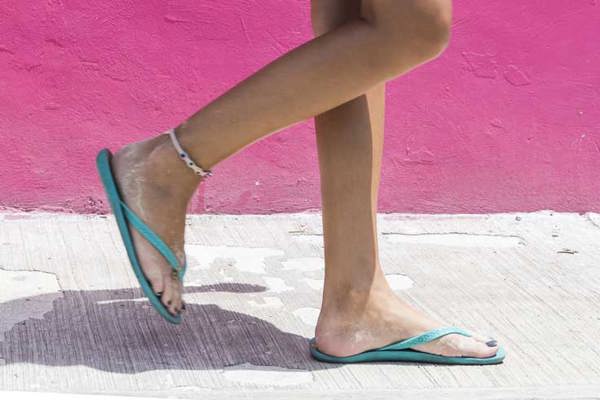Summer Footwear
28 November 2018 | By Elyse Bradbury

Thongs are a popular choice of footwear over summer and for a long time therapists have talked to clients about the potential side effects of spending
many hours in thongs. Its not uncommon as a Physiotherapist to see an increase in foot pain over summer and it’s usually due to the sudden change in
footwear.
As Physiotherapists we often talk with clients about injury prevention through means of ‘load management’, and often load is understood as weights we lift,
kilometers we run, flights of stairs we take at work or the number of laps we swim per week. But changing equipment, including footwear, is also a
change in load. Its well understood that thongs provide less support than runners and now research demonstrates exactly how our walking changes when
we wear thongs.
A study by Zhang, Paquette and Zhang (2013)* demonstrates that walking in thongs compared to walking in shoes increases ground reaction force, increases
loading through the foot and decreases stance phase. Walking in thongs also shifts the center of pressure more medially.
Shroyer and Wendi (2010)** found similar changes; such as increased plantar pressure, increased dorsi-flexion moment on swing phase and reduced hallux
dorsiflexion likely because the toes must grip to hold the thong in place.
This all equates to a foot that has to work much harder than it does in shoes. As the muscles of the foot work harder to hold the thong in place they fatigue
and reduce their capacity to perform their primary role of stabilizing the foot.
In summary, thongs do not provide support for the foot. If you have spent most of the year in shoes, a sudden swap to thongs can fatigue the supporting
muscles of the foot and lead to pain or injury. This can be made worse if you already have a foot pathology. It's still ok to wear thongs. Just don’t
wear them all the time. Also, consider more supportive options.
Spring Physio Gym will be stocking Archies as we approach summer - thongs with arch support and firmer fitting
strap to reduce toe clawing.
If you have any questions about your footwear please make an appointment to see one of our Physiotherapists.
* Zhang, X., Paquette, M. R. and Zhang, S. (2013). A comparison of gait biomechanics of flip-flops, sandals, barefoot and shoes. Journal of foot and ankle
research. 6,45.
** Justin F. Shroyer and Wendi H. Weimar (2010) Comparative Analysis of Human Gait While Wearing Thong-Style Flip-flops versus Sneakers. Journal of the
American Podiatric Medical Association. 100, 4, pp. 251-257.




